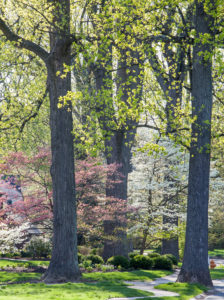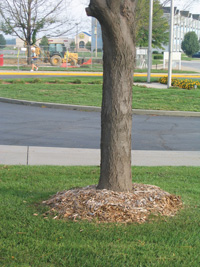That shade tree in your yard or by the street, is it worth any money?

Worth any money to whom, you may ask.
Worth money to your family:
- Your shade tree can save up to 56% of summer air-conditioning costs;
- An evergreen tree can save up to 3% of winter heating costs;
- Large specimen trees can increase property value by 10%;
- Each large tree in front can add 1% to your house sale price.
Worth money to your family and your neighbors’ families
Your tree improves our air quality by
- Absorbing pollutants through its leaves (ozone, nitrogen dioxide, sulfur dioxide);
- Intercepting particles (dust, ash, smoke), releasing oxygen;
- Lowering air temperatures (which decreases ozone production);
- Reducing emissions by power plants by decreasing energy needs;
- Protecting your family’s health. How much is saved by avoiding asthma attacks, headaches, lung and heart diseases, and cancers due to air pollution?
Your tree helps keep your basement dry, and those of neighbors downhill, and helps decrease those huge pools at our intersections by
- Intercepting and holding rain water on leaves and bark to evaporate;
- Taking up water through the roots, and transpiring it back into the air.
Consider the Willow Oak in our yard, planted 17 years ago. Measured at
4 1/2 feet from the ground, 53 1/2 inches around, diameter is 17 inches
(C = π d, right?). The Tree Benefit Calculator says it saves us $137 this year, and as it grows it will save more!
The financial benefits from this one tree
- 114 kilowatt hours of cooling this summer
- 4 therms of natural gas for heating next winter
- Property value increased by about $76 this year
- Keeping our basement dry as well as those of our neighbors downhill, it takes up 3,837 gallons of stormwater this year alone.
- For our family and the neighborhood, it cools the air, and captures air pollutants and decreases their production, contributing to our health.
Try this Tree Benefit Calculator to see how much economic and environmental value your tree contributes, and how much might be lost if you take down a tree:

